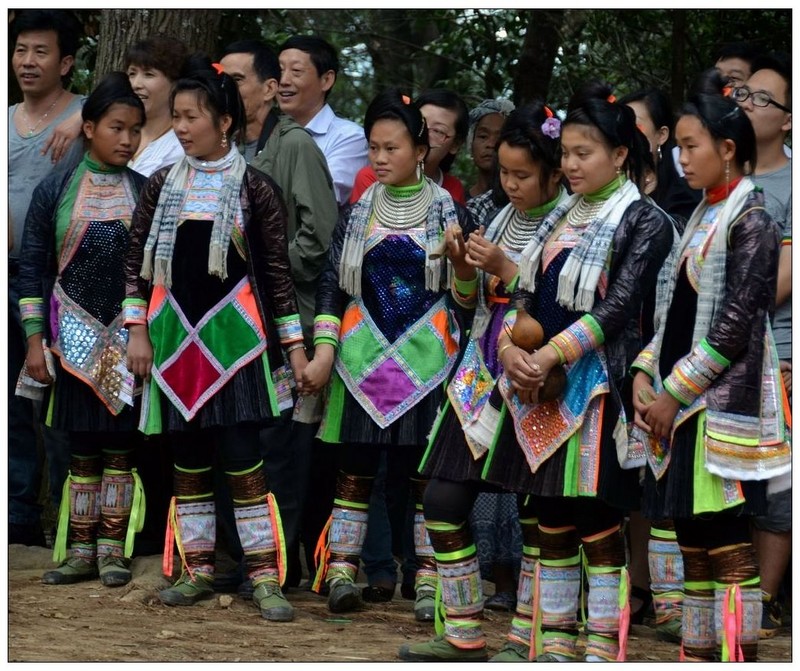

The Miao nationality is one of the minority nationalities in China. It has over 7,300,000 people. They are scattered widely over Guizhou, Yunnan, Guangxi, Sichuan, Hainan and Hubei. The main settlements are the Southeastern Guizhou Miao and Dong Autonomous Prefecture, the Southern Guizhou Bouyei and Miao Autonomous Prefecture, the Southwestern Guizhou Bouyei and Miao Autonomous Prefecture, the Western Hunan Tujia and Miao Autonomous Prefecture, the Wenshan Zhuang and Miao Autonomous Prefecture in Yunnan, and the Rongshui Miao Autonomous County in Guangxi Province.
The main settlements are the Southeastern Guizhou Miao and Dong Autonomous Prefecture, the Southern Guizhou Bouyei and Miao Autonomous Prefecture, the Southwestern Guizhou Bouyei and Miao Autonomous Prefecture, the Western Hunan Tujia and Miao Autonomous Prefecture, the Wenshan Zhuang and Miao Autonomous Prefecture in Yunnan, and the Rongshui Miao Autonomous County in Guangxi Province.
The Miaos have very long history. Because they are scattered very widely, people in different places have quite different customs, and they have many self-acknowledged names and names used by others. After the establishment of new China, their name is standardized as "Miao" according to their own will.  The Miaos have their own language and characters. The Miao language belongs to the Miao-Yao family in the Sino-Tibetan Family, and it has three dialects: the Western Hunan dialect (in the east), the northern Guizhou dialect (in the middle) and the Sichuan-Guizhou-Yunnan dialect (in the west). Each dialect has several sub-dialects and local dialects. The Miao writing has two styles: the "old Miao writing" created at the beginning of the 20th century and the "new Miao writing" created after the new China was founded.
The Miaos have their own language and characters. The Miao language belongs to the Miao-Yao family in the Sino-Tibetan Family, and it has three dialects: the Western Hunan dialect (in the east), the northern Guizhou dialect (in the middle) and the Sichuan-Guizhou-Yunnan dialect (in the west). Each dialect has several sub-dialects and local dialects. The Miao writing has two styles: the "old Miao writing" created at the beginning of the 20th century and the "new Miao writing" created after the new China was founded.
The Miaos focus on traditional paddy-planting agriculture, and the level of forestry, animal husbandry, sideline production, fishery and industry is also high. On diet, rice is general staple food, and they like wine and vinegar-pepper food. On clothes and adornments, the materials, colors and styles are of all kinds and are bright and colorful. Their clothes are divided into five big types including 480 kinds. All kinds of jewels are feasts for the eyes and are extraordinarily splendid. The skills of embroidery are widely spread and are of high artistry, and have varied sewing methods. Villages are founded at the foot of mountains, and the houses are of tow kinds: one-storey houses and buildings. A house with hanging feet, which is built by wooden parts and covered by tiles, is the most characteristic.
 The Miaos believe in animism of original religion. There are many festivals, such as the Miao New Year, the New Product Eating festival, the festival of Eating Bulls' Internal Organs, the Eighth of April, the Reed-pipe festival, the Dragon Boat festival, etc. Entertaining activities are very abundant, such as singing in antiphonal style, stepping with reed pipes, horse racing, horse fight, bullfight, cockfight, knife-pole climbing, swinging, etc.
The Miaos believe in animism of original religion. There are many festivals, such as the Miao New Year, the New Product Eating festival, the festival of Eating Bulls' Internal Organs, the Eighth of April, the Reed-pipe festival, the Dragon Boat festival, etc. Entertaining activities are very abundant, such as singing in antiphonal style, stepping with reed pipes, horse racing, horse fight, bullfight, cockfight, knife-pole climbing, swinging, etc.
You will only receive emails that you permitted upon submission and your email address will never be shared with any third parties without your express permission.
